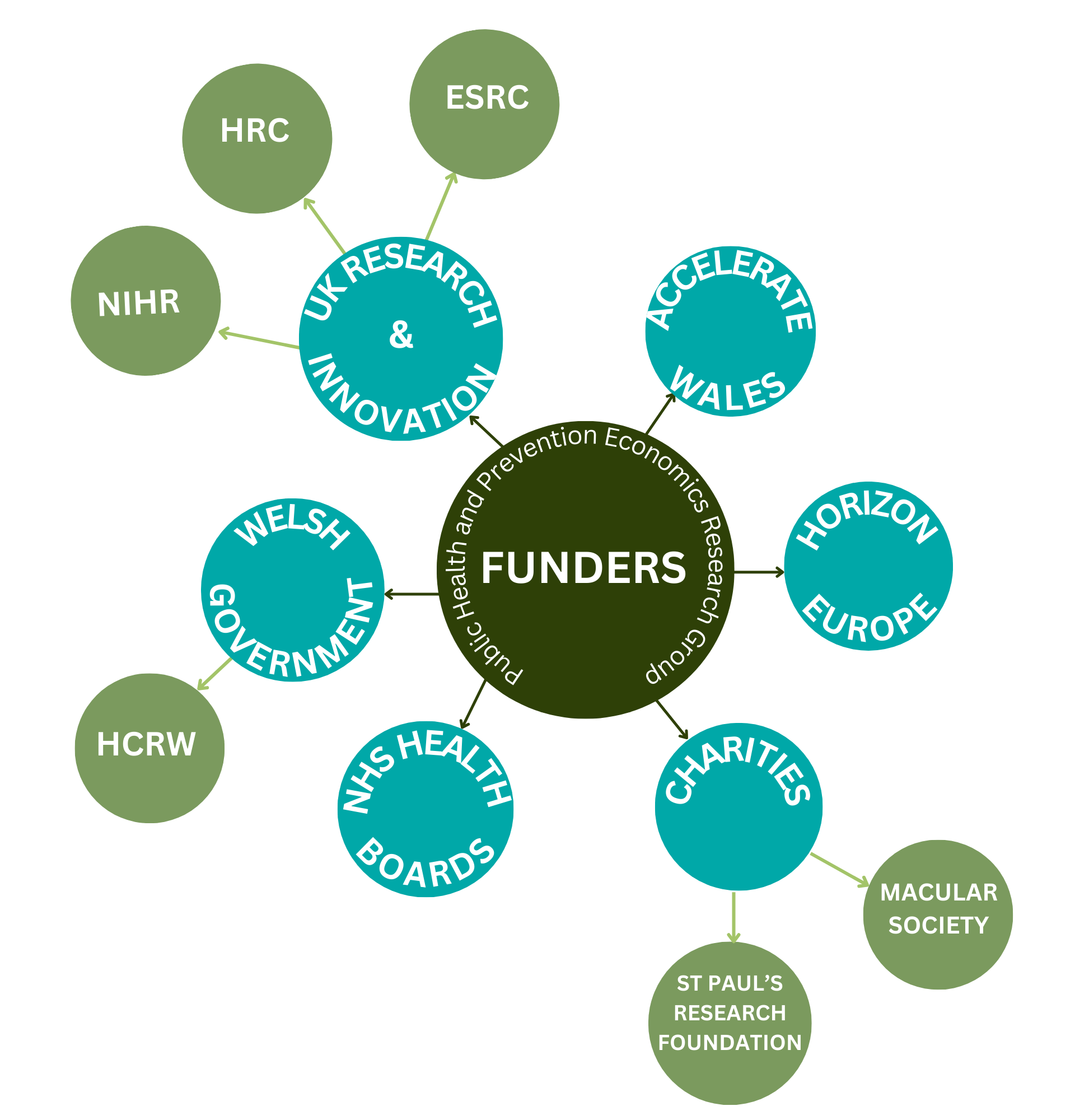Public Health and Prevention Economics Research
The Public Health and Prevention Economics Research Group (PHERG) is part of the Centre for Health Economics and Medicines Evaluation (CHEME) within the School of Medical and Health Sciences and part of the multidisciplinary Bangor Institute for Health and Medical Research (BIHMR) group. Our research adopts a life-course model applying methods of health economics evaluation to trials and other study designs in the evaluation of public health and psychosocial interventions at both programme and system level. Our research has applications within the NHS, third sector organisations, and Government. Much of our research is funded by NIHR,, HTA, charities, and Welsh Government.
PHERG is led by Rhiannon Tudor Edwards BSc. Econ, M.A., D.Phil., Hon. MFPH, Professor of Health Economics.
Our Skill Set
With a research and policy lens, we apply health economics to public health and prevention, well-being and well-becoming.
Our expertise and the methods we use are displayed in this infographic:

International evidence points towards the greatest return on investment coming from investment in the first three years of life. Our research shows that positive preventive actions during child development are the most important ways to intervene and yield the greatest return on investment to society.
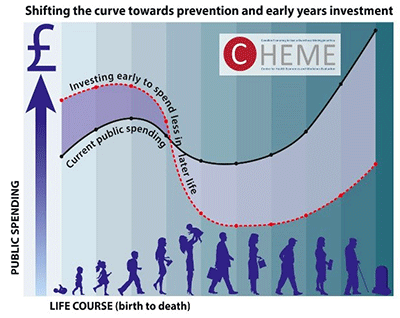
The CHEME Transforming Young Lives across Wales report can be found here.
This new infographic shows how factors impact on wellbeing through life course.
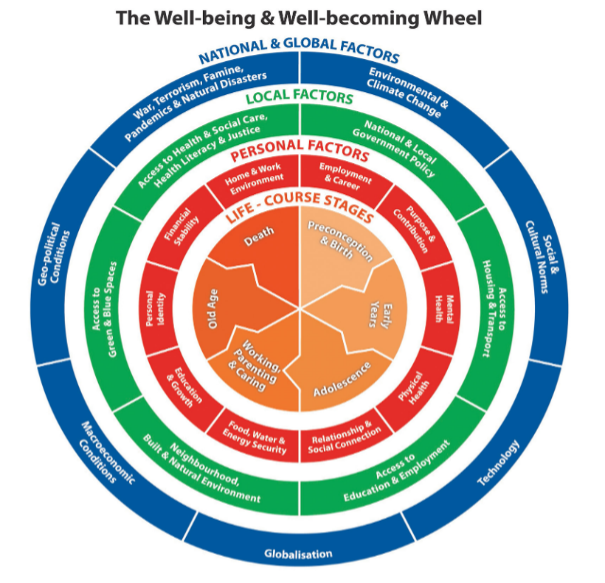
Our Impact

Research and policy support activities
Methodology of public health economics
Handbooks in Health Economic Evaluation, Applied Health Economics for Public Health Practice and Research, edited by Rhiannon Tudor Edwards and Emma McIntosh, published by Oxford University Press.
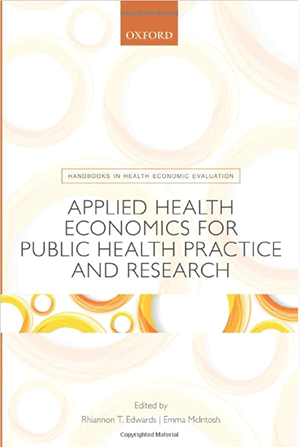
Our publications
PHERG publications 2023
- Anthony, B. F., Disbeschl, S., Goulden, N., Hendry, A., Hiscock, J., Hoare, Z., Roberts, J., Rose, J., Surgey, A., Williams, N. H., Walker, D., Neal, R., Wilkinson, C., & Edwards, R. T. (2023). Earlier cancer diagnosis in primary care: a feasibility economic analysis of ThinkCancer! https://doi.org/10.3399/BJGPO.2022.0130
- Casswell, E. J., Cro, S., Cornelius, V. R., Banerjee, P. J., Zvobgo, T. M., Edwards, R. T., Ezeofor, V., Anthony, B., Shahid, S. M., Bunce, C., Kelly, J., Murphy, C., Robertson, E., & Charteris, D. (2023). Clinical science Randomised controlled trial of adjunctive triamcinolone acetonide in eyes undergoing vitreoretinal surgery following open globe trauma: The ASCOT study. Br J Ophthalmol, 0, 1–9. https://doi.org/10.1136/bjo-2022-322787
- Doungsong, K., Hartfiel, N., Gladman, J., Harwood, R. H., & Tudor Edwards, R. (2023). RCT-based Social Return on Investment (SROI) of a home exercise programme for people with early dementia comparing in-person and blended delivery before and during the COVID-19 pandemic. https://doi.org/10.1101/2023.08.25.23294408
- Edwards, R. T., Ezeofor, V., Bryning, L., Anthony, B. F., Charles, J. M., & Weeks, A. (2023). Prevention of postpartum haemorrhage: Economic evaluation of the novel butterfly device in a UK setting. European Journal of Obstetrics and Gynecology, 283, 301–2115. https://doi.org/10.1016/j.ejogrb.2023.02.020
- England, C., Jarrom, D., Washington, J., Hasler, E., Batten, L., Lewis, R., Edwards, R. T., Davies, J., Collins, B., Cooper, A., & Edwards, A. (2023). Measuring Mental Health in a Cost-of-Living Crisis: Rapid review RR0006 Measuring Mental Health in a Cost-of-Living Crisis: a rapid review. https://doi.org/10.1101/2023.07.24.23293078
- Edwards, D., Csontos, J., Gillen, E., Hutchinson, G., Sha’aban, A., Carrier, J., Lewis, R., Edwards, R. T., Davies, J., Collins, B., Cooper, A., & Edwards, A. (2023). What is the forecasted prevalence and incidence of long-term conditions in Wales: a rapid evidence map. https://doi.org/10.1101/2023.06.23.23291814
- Granger, R., & Kubis, H. P. (2023). Too much is too much: Influence of former stress levels on food craving and weight gain during the COVID-19 period. PLoS ONE, 18(4 April). https://doi.org/10.1371/journal.pone.0277856
- Harwood, R. H., Goldberg, S. E., Brand, A., Wardt, V. van Der, Booth, V., Lorito, C. Di, Hoare, Z., Hancox, J., Bajwa, R., Burgon, C., Howe, L., Cowley, A., Bramley, T., Long, A., Lock, J., Tucker, R., Adams, E. J., O’Brien, R., Kearney, F., … Masud, T. (2023). Promoting Activity, Independence, and Stability in Early Dementia and mild cognitive impairment (PrAISED): randomised controlled trial. BMJ, 382, e074787. https://doi.org/10.1136/BMJ-2023-074787
- Hartfiel, N., Gittins, H., Morrison, V., Wynne-Jones, S., Dandy, N., & Edwards, R. T. (2023). Social Return on Investment of Nature-Based Activities for Adults with Mental Wellbeing Challenges. International Journal of Environmental Research and Public Health, 20(15). https://doi.org/10.3390/ijerph20156500
- O’toole, S., Moazzez, R., Wojewodka, G., Zeki, S., Jafari, J., Hope, K., Brand, A., Hoare, Z., Scott, S., Doungsong, K., Ezeofor, V., Edwards, R. T., Drakatos, P., & Steier, J. (2023). Single-centre, single-blinded, randomised, parallel group, feasibility study protocol investigating if mandibular advancement device treatment for obstructive sleep apnoea can reduce nocturnal gastro-oesophageal reflux (MAD-Reflux trial). https://doi.org/10.1136/bmjopen-2023-076661
- Makanjuola, A., Granger, R., Pisavadia, K., & Edwards, R. T. (2023). Is lifestyle coaching a potential cost-effective intervention to address the backlog for mental health counselling? A Rapid Review. MedRxiv, 2023.01.20.23284835. https://doi.org/10.1101/2023.01.20.23284835
- Makanjuola, A., Lynch, M., Hartfiel, N., Cuthbert, A., & Edwards, R. (2023). Prevention of Poor Physical and Mental Health through the Green Social Prescribing Opening Doors to the Outdoors Programme: A Social Return on Investment Analysis. International Journal of Environmental Research and Public Health, 20(12), 6111. https://doi.org/10.3390/ijerph20126111
- Makanjuola, A., Lynch, M., Spencer, L. H., & Edwards, R. T. (2023). Prospects and Aspirations for Workforce Training and Education in Social Prescribing. International Journal of Environmental Research and Public Health, 20(16), 6549. https://doi.org/10.3390/ijerph20166549
- Prendergast, L. M., Toms, G., Seddon, D., Jones, C., Anthony, B. F., & Edwards, R. T. (2023). Supporting social connection for people living with dementia: lessons from the findings of the TRIO study. Working with Older People. https://doi.org/10.1108/WWOP-10-2022-0050
- Skinner, A., Hartfiel, N., Lynch, M., Jones, A. W., & Edwards, R. T. (2023). Social Return on Investment of Social Prescribing via a Diabetes Technician for Preventing Type 2 Diabetes Progression. International Journal of Environmental Research and Public Health, 20(12), 6074. https://doi.org/10.3390/ijerph20126074
- Spencer, L. H., Albustami, M., Khanom, A., Porter, A., Naha, G., Thomas, R. L., … Edwards, R. T. (2023). CYMELL Study: rapid review of the evidence. Retrieved February 15, 2023, from PROSPERO website: https://www.crd.york.ac.uk/prospero/#recordDetails
- Spencer, L. H., Hendry, A., Makanjuola, A., Anthony, B., Davies, J., Pisavadia, K., … Edwards, A. (2023). What interventions or best practice are there to support people with Long COVID, or similar post-viral conditions or conditions characterised by fatigue, to return to normal activities: a rapid review. Retrieved February 2, 2023, from medRxiv preprint website: https://www.medrxiv.org/content/10.1101/2023.01.24.23284947v1
- Spencer, L. H., Lynch, M., Thomas, G. M., & Edwards, R. T. (2023). Intergenerational Deliberations for Long Term Sustainability. Retrieved February 12, 2023, from Challenges website: https://www.mdpi.com/2078-1547/14/1/11?fbclid=IwAR039SCJmhvW5csmgs0eZbP3jSJ9xi511IdH4E5ac4BXcq87yEpFPRft-4w
- Spencer, L., Hendry, A., Makanjuola, A., Anthony, B. F., Davies, J., Pisavadia, K., Hughes, D., Fitzsimmons, D., Wilkinson, C., Edwards, R. T., Lewis, R., Cooper, A., & Edwards, A. (2023). Supporting people with long COVID What interventions or best practice are there to support people with Long COVID, or similar post-viral conditions or conditions characterised by fatigue, to return to normal activities: a rapid review. https://doi.org/10.1101/2023.01.24.23284947
- Spencer, L. ;, Hendry, A. ;, Makanjuola, A. ;, Pisavadia, K. ;, Davies, J. ;, Albustami, M. ;, Anthony, B. ;, Wilkinson, C. ;, Fitzsimmons, D. ;, Hughes, D. ;, Edwards, R., Tudor, ;, Lewis, R. ;, Cooper, A. ;, Edwards, A., Spencer, L., Makanjuola, A., Albustami, J., & Anthony, M. (2023). What is the effectiveness and cost-effectiveness of interventions in reducing the harms for children and young people who have been exposed to domestic violence or abuse: a rapid review.
- Spencer, L. H., Lynch, M., Thomas, G. M., & Edwards, R. T. (2023). Intergenerational Deliberations for Long Term Sustainability. Challenges, 14(1), 11. https://doi.org/10.3390/challe14010011
- Toms, G. R., Stringer, C. L., Prendergast, L. M., Seddon, D., Anthony, B. F., & Edwards, R. T. (2023). A Study to Explore the Feasibility of Using a Social Return on Investment Approach to Evaluate Short Breaks. https://doi.org/10.1155/2023/4699751
- Weeks, A. D., Cunningham, C., Taylor, W., Rosala-Hallas, A., Watt, P., Bryning, L., Cregan, L., Hayden, E., Lambert, D., Bedwell, C., Lane, S., Fisher, T., Edwards, R. T., & Lavender, T. (2023). A mixed method, phase 2 clinical evaluation of a novel device to treat postpartum haemorrhage. European Journal of Obstetrics and Gynecology, 283, 142–148. https://doi.org/10.1016/j.ejogrb.2023.01.018
PHERG publications 2022
- Cooledge, B., & Spencer, L. (2022). Siaradwyr Cymraeg mewn ymchwil iechyd a gofal yng Nghymru – Golwg360. https://golwg.360.cymru/gwerddon/2105428-siaradwyr-cymraeg-mewn-ymchwil-iechyd-gofal
- Edwards, R. (2022). Through the life-course in public health economics research and policy: A new infographic. Frontiers in Public Health, 10, 5147. Retrieved fromhttps://www.frontiersin.org/articles/10.3389/fpubh.2022.1035260/full
- Ezeofor, V. ‘Segun, Spencer, L. H., Rogers, S. N., Kanatas, A., Lowe, D., Semple, C. J., Hanna, J. R., Yeo, S. T., & Edwards, R. T. (2022). An Economic Evaluation Supported by Qualitative Data About the Patient Concerns Inventory (PCI) versus Standard Treatment Pathway in the Management of Patients with Head and Neck Cancer. PharmacoEconomics - Open, 6(3), 389–403. https://doi.org/10.1007/s41669-021-00320-4
- Granger, R., Genn, H., & Tudor Edwards, R. (2022). Health economics of health justice partnerships: A rapid review of the economic returns to society of promoting access to legal advice. https://doi.org/10.3389/fpubh.2022.1009964
- Hartfiel, N., Gladman, J., Harwood, R., & Tudor Edwards, R. (2022). Social Return on Investment of Home Exercise and Community Referral for People With Early Dementia. Gerontology and Geriatric Medicine, 8. https://doi.org/10.1177/23337214221106839
- Makanjuola, A., Lynch, M., Hartfiel, N., Cuthbert, A., Wheeler, H. T., & Edwards, R. T. (2022). A Social Return on Investment Evaluation of the Pilot Social Prescribing EmotionMind Dynamic Coaching Programme to Improve Mental Wellbeing and Self-Confidence. Public Health, 19. https://doi.org/10.3390/ijerph191710658
- Roberts, G., Holmes, J., Williams, G., Chess, J., Hartfiel, N., Charles, J. M., McLauglin, L., Noyes, J., & Edwards, R. T. (2022). Current costs of dialysis modalities: A comprehensive analysis within the United Kingdom. Peritoneal Dialysis International, 42(6), 578–584. https://doi.org/10.1177/08968608211061126
- Spencer, L., Hendry, A., Makanjuola, A., Davies, J., Pisavadia, K., Hughes, D., Fitzsimmons, D., Wilkinson, C., Edwards, R. T., Lewis, R., Cooper, A., & Edwards, A. (2022). What is the long-term impact of COVID-19 on the Health-Related Quality of Life of individuals with mild symptoms (or non-hospitalised): A rapid review. https://doi.org/10.1101/2022.09.09.22279642
- Spencer, L., Hartfiel, N., Hendry, A., Anthony, B., Makanjuola, A., Pisavadia, K., Davies, J., Bray, N., Hughes, D., Wilkinson, C., Fitzsimmons, D., Edwards, R. T., Edwards, A., Gal, M., Cooper, A., & Lewis, R. (2022). What innovations can address inequalities experienced by women and girls due to the COVID-19 pandemic across the different areas of life/domains: work, health, living standards, personal security, participation and education?http://www.primecentre.wales/resources/RR/Clean/RR00027_Wales_COVID-19_Evidence_Centre-
- Whiteley, H., Lynch, M., Hartfiel, N., Beharrell, W., Cuthbert, A., & Edwards, R. T. (2022). A social Return on Investment (SROI) evaluation of the Fathom trust 'Making well' programme. https://fathomtrust.com/stories/making-well-a-social-return-on-investment-report/
Our Funders
Current Projects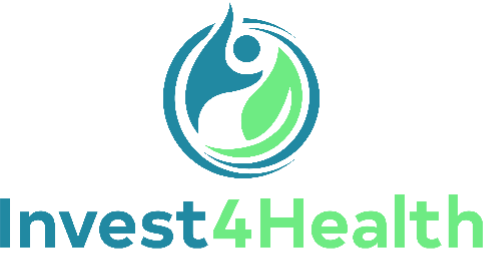
Horizon Europe Invest4Health
The Centre for Health Economics and Medicines Evaluation (CHEME) are key partners in the EU Invest4Health project. This Horizon Europe collaboration across eight countries has been funded as one of the four large research programmes on the HORIZON-HLTH-2022-CARE-08-04 — Better financing models for health systems call. CHEME’s key contribution to this project include exploring what is meant by Smart Capacitating Investment (SCI), across the public, private and voluntary sectors at a macro, meso and micro level, and testing and evaluating proposed SCI models that aim to provide sustainable funding for preventive health measures in the post-COVID-19 healthcare landscape.
Advice on Prescription
Citizens Advice on Prescription (CAP) is a welfare and social prescribing intervention provided by Citizens Advice L iverpool Health Programme | Citizens Advice (citizensadviceliverpool.org.uk). The aim of CAP is to provide a single ‘gateway’ from health services in Liverpool into a holistic social and welfare support offer. A key element of the CAP service is that it is designed both to improve the lives of individuals, but also provide support for the health care system, with the aim to reduce the pressures from non-health issues on the health service.
iverpool Health Programme | Citizens Advice (citizensadviceliverpool.org.uk). The aim of CAP is to provide a single ‘gateway’ from health services in Liverpool into a holistic social and welfare support offer. A key element of the CAP service is that it is designed both to improve the lives of individuals, but also provide support for the health care system, with the aim to reduce the pressures from non-health issues on the health service.
The public health economics team, in conjunction with The University of Liverpool, are currently evaluating the effectiveness and cost-effectiveness of the CAP program. For the health economic analyses, we will be using health related quality of life (HRQOL) utility values as well as changes in health service usage (e.g., number of GP and hospital visits), and program costings to carry out a cost effectiveness analysis (CEA) and social return on investment (SROI) on the intervention.
KiVa
The Centre for Health Economics and Medicines Evaluation (CHEME), Bangor University, are delivering the health econo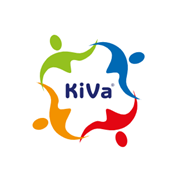 mic evaluation of the universal KiVa anti-bullying programme as part of the UK Stand Together trial. Over 25% of UK children are bullied on a regular basis and bullying in school can impact absenteeism, academic achievement and result in bullied children accessing more mental health services compared to non-bullied children. The potential detrimental life course health and social care consequences highlight the importance of a preventative public health approach to reducing childhood bullying. The UK Stand Together trial is providing the first large-scale randomised control trial evaluation of the KiVa programme in England and Wales, investigating if KiVa is more effective and cost-effective in reducing bullying in UK primary schools compared to schools’ usual approach to addressing bullying. KiVa is a complex, multicomponent intervention delivered within a complex education system. We are applying a broad evaluative lens to deliver comprehensive and relevant cost-effectiveness evidence for decision-makers.
mic evaluation of the universal KiVa anti-bullying programme as part of the UK Stand Together trial. Over 25% of UK children are bullied on a regular basis and bullying in school can impact absenteeism, academic achievement and result in bullied children accessing more mental health services compared to non-bullied children. The potential detrimental life course health and social care consequences highlight the importance of a preventative public health approach to reducing childhood bullying. The UK Stand Together trial is providing the first large-scale randomised control trial evaluation of the KiVa programme in England and Wales, investigating if KiVa is more effective and cost-effective in reducing bullying in UK primary schools compared to schools’ usual approach to addressing bullying. KiVa is a complex, multicomponent intervention delivered within a complex education system. We are applying a broad evaluative lens to deliver comprehensive and relevant cost-effectiveness evidence for decision-makers.
Our core staff working with Professor Edwards
- Professor Rhiannon Tudor Edwards - Professor of Health Economics and the founding Director of health economics research at Bangor University and Co-Director of CHEME, and Co-Director of Health and Care Economics Cymru (HCEC)
- Ann Lawton - CHEME Administrator and Administrator for Health and Care Economics Cymru (HCEC)
- Dr Bethany Anthony - Research Officer in Health Economics
- Dr Ned Hartfiel - Research Officer in Health Economics and Co-Lead for the CHEME Social Value Hub
- Dr Victory Ezeofor - Mathematical/Statistical Modeller in Health Economics
- Dr Catherine Lawrence - Reader Support and Specialist Mentor (Students)
- Dr Llinos Haf Spencer - Research Officer in Health Economics
- Dr Holly Whiteley - Research Officer in Health Economics
- Dr Rachel Granger - Research Officer in Health Economics
- Dr Ceryl Davies - Lecturer in Health Sciences (Social Work)
- Dr Sofie Roberts - Research Officer in Health Economics
- Kalpa Pisavadia - Research Project Support Officer
- Jacob Davies - Research Project Support Officer
- Pim Doungsong - Research Project Support Officer
- Laura Lynch - Research Project Support Officer
Alumni
- Dr Gethin Griffiths - Director of Outcomes Research, GSK
- Dr Natalia Ivashikina - Senior Lecturer in Global Health Economics, Brighton and Sussex Medical School
- Alan Ó Céilleachair - Researcher, University College Cork, Ireland
- Dr Laura Ternent - Senior Lecturer, Newcastle University
- Dr Laura Timmis - Research Officer, CHEME, Bangor University
- Alex Torbuck - PhD candidate, University of Rochester, New York
- Dr. Sayed Ramin Ziwary - The World Bank Young Professional Program
- Dr Jo Charles - Deputy Head of Health Economics, Finance Directorate, Health and Social Services Group, Welsh Government
- Dr Huw Lloyd-Williams - Research Officer, CHEME, Bangor University
- Abraham Makanjuola - Research Officer in Health Economics
PGR students
- Sharon Hadley, Oxford Mindfulness Centre
- Seow Tien Yeo
- Professor Stephen Robson, leader in health and health policy in Australia
- Dr Vladyslav Kulikov, MD
- Dmytro Babelyuk
- Eira Winrow, Lecturer in Health Sciences at Bangor University
- Jacob Davies, Research Project Support Officer at CHEME
Postgraduate research opportunities/scholarship
We offer a Master by Research in Public Health and Prevention Economics.
Teaching
- Medical students at North Wales Medical School, Bangor University.
- Rhiannon offers student selected component (SSC; 2nd to 4th year) a ‘Public health and prevention economics research across the life-course’ experience project.
- Students will have an opportunity to join the Public Health and Prevention Economics Research network at CHEME.
- Rhiannon offers bespoke lectures on public health economics and related topics:
- At Bangor University, NHS 4003 Introduction to Health Economics, taught through the School of Health Sciences Public Health and Health Promotion programme. She teaches on the Bangor University Health Services Research Summer School. Opportunities for teaching public health economics for medical students are under discussion.
- At the University of Liverpool, Masters of Public Health course.
Health economics of well-being and well-becoming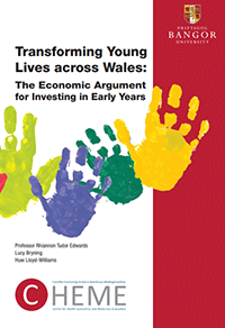
- Upcoming: Oxford University Press (OUP) book - Health economics of well-being and well-becoming: post-pandemic opportunities for research and policy
- Social Return on Investment of Joio Dance Programme, via the Social Value Hub – current project
- New therapeutic coaching approach for improving emotional wellbeing (EMD coaching), in collaboration with Cardiff University, funder: The Accelerate Programme – current project (via the CHEME Social Value Hub)
- The Outdoor Partnership: 'Opening Doors to the Outdoors' (OD O) Programme, In collaboration with Cardiff University. Funder: The Accelerate Programme.
- The Fathom Trust Making Well Green Social Prescribing Programme.
- Well-being and well-becoming through the life-course in public health economics research and policy: A new infographic
Research projects and collaborations through the life-course
Early years and childhood
- Speak Out Stay Safe (SOSS) programme, in collaboration with the University of Central Lancashire, funded by NSPCC – current project. View the summary report. (*please note we are working on providing a fully accessible version of this document)
- Transforming Young Lives across Wales report, commissioned by Public Health Wales – completed project
Adolescents and young people
- A multicentre cluster randomised controlled trial to evaluate the effectiveness and cost-effectiveness of KiVa to reduce bullying in primary schools, led by Bangor University, funded by NIHR - current project
- CHoosing Active Role Models to INspire Girls (CHARMING) – a cluster feasibility study of a schools-based community linked programme to increase physical activity in 9-11 year-old girls, in collaboration with Cardiff university, funded by Health and Care Research Wales, Welsh Government – current project
- Families and social care research
- Bangor University led research project focused on exploring the enablers and barriers to engagement with care leavers, funded by Health and Care Research Wales
Working age
- Evaluating the health impact and cost-effectiveness of Ways-to-Wellbeing, a whole system approach to mitigate poverty over the life course, in collaboration with the University of Liverpool, funded by NIHR – current project
- Shared Roadmap for System Change, in collaboration with the University of Central Lancashire, funded by Women’s Aid and Safer Lives – current project
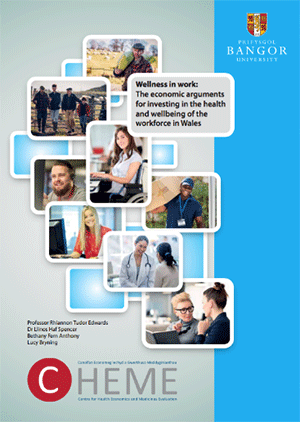 Wellness in Work report, commissioned by Public Health Wales - completed project
Wellness in Work report, commissioned by Public Health Wales - completed project - PROPSER, Feasibility study and pilot trial of an evidence-based low intensity psychosocial intervention delivered by lay therapists for asylum seekers and refugees (PROSPER), in collaboration with the University of Liverpool, funded by NIHR – completed project
- MAP ALLIANCE Optimising care for perinatal anxiety: Evaluation of health service utilisation, outcomes and costs
Older age – living well for longer
- Trio Shared Lives (short breaks for people with dementia), led by Bangor University, funded by Health and Care Research Wales, Welsh Government
- Promoting Activity, Independence and Stability in Early Dementia (PrAISED) research programme, in collaboration with the University of Nottingham, funded by NIHR - current project
- A randomised controlled trial and feasibility study of the effects of an e-health intervention ‘iSupport’ for reducing distress of dementia carers,
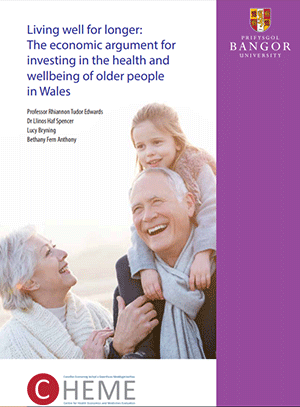 especially in the ongoing pandemic of COVID-19, led by Bangor University, funded by NIHR – current project
especially in the ongoing pandemic of COVID-19, led by Bangor University, funded by NIHR – current project - The impact of peer support networks for those living with rare dementias, in collaboration with University College London, funded by ESRC and NIHR – current project
- Living Well for Longer report, commissioned by Public Health Wales
Where and how we die well
- Ziwary, S. R., Samad, D., Johnson, C. D., & Edwards, R. T. (2017). Impact of place of residence on place of death in Wales: an observational study. BMC Palliative Care, 16(1), 1-6.
Evaluation of medical devices and technologies
- Clinical Development of an Ultrasensitive OCT Device to Improve the Management of Eye Disease, in collaboration with the University of Liverpool – funded by HTA, current project
- PPH Butterfly: clinical testing and commercial development, lead institution University of Liverpool, in collaboration with Liverpool Women’s Hospital and the University of Liverpool – funded by NIHR, completed
- Novel treatment for peripheral arterial disease (FlowOx), in collaboration with OTIVIO AS – funded by Horizon 2020, completed
Economic evaluation of sight loss and sight preserving surgery
- Access to counselling during sight loss survey, led by Bangor University – funded by North Wales Society for the Blind, current
- Adjunctive Steroid Combination in Ocular Trauma (ASCOT), in collaboration with Moorfield’s Eye Hospital and King’s College London, funded by NIHR, current
- WASh multicentre randomised controlled trial: water-assisted sigmoidoscopy in English NHS bowel scope screening, in collaboration with University Hospital of North Tees, funded by NIHR - completed
- Routine use of Patient Concerns Inventory for head and neck cancer patients, in collaboration with Aintree Hospital, funded by NIHR, completed
